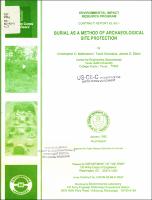Please use this identifier to cite or link to this item:
https://hdl.handle.net/11681/25976Full metadata record
| DC Field | Value | Language |
|---|---|---|
| dc.contributor.author | Mathewson, Christopher C. | - |
| dc.contributor.author | Eblen, James S. | - |
| dc.contributor.author | Gonzalez, Tania | - |
| dc.date.accessioned | 2018-01-04T15:13:21Z | - |
| dc.date.available | 2018-01-04T15:13:21Z | - |
| dc.date.issued | 1992-01 | - |
| dc.identifier.uri | http://hdl.handle.net/11681/25976 | - |
| dc.description | Contract Report | en_US |
| dc.description.abstract | Federal and State laws require that archeological sites must be protected from adverse impacts caused by engineering projects. Archaeological excavation has been the most common means of providing site protection. However, it has been proposed that sites can be protected through burial below an engineered cover, if the engineering project does not require excavation. An investigation of the physical and chemical changes in buried soils was carried out at fill sites ranging in age from 40 to 130 years. It was found that buried soils differ taxonomically from unburied soils at the suborder and lower levels. Buried soils have thicker soil profiles; yellower hues, lower values, and lower chromas; coarser structure; fewer calcium carbonate concretions; increased gleying and mottling; and preserved organic carbon. A related field test using burial to protect against construction equipment loading was carried out at an artificial archaeological site. Protection against equipment loading increases as the thickness or stiffness of the cover increases. Burial was found to cause some breakage of the test artifacts. Physical and chemical changes in the buried soils are controlled by the site geology, climate, hydrogeology, and local geomorphology. Artifact breakage is controlled by the depth of burial, the compressibility of the burial matrix, and artifact orientation. Burial of an archaeological site tends to increase the moisture content, induce reducing conditions, and increase site compression, while excavation of the site removes the artifacts from their natural environment and destroys spatial relationships. | en_US |
| dc.description.sponsorship | Environmental Impact Research Program (U.S.) | en_US |
| dc.language.iso | en_US | en_US |
| dc.publisher | Environmental Laboratory (U.S.) | en_US |
| dc.relation.ispartofseries | Contract report;EL-92-1 | - |
| dc.rights | Approved for public release; distribution is unlimited. | - |
| dc.source | This Digital Source was created from scans of the Print Resource. | - |
| dc.subject | Salvage archaeology | en_US |
| dc.subject | Archaeology--Methodology | en_US |
| dc.subject | Cultural property--Protection | en_US |
| dc.subject | Soil science in archaeology | en_US |
| dc.title | Burial as a method of archaeological site protection | en_US |
| dc.type | Report | - |
| Appears in Collections: | Contract Report | |
Files in This Item:
| File | Description | Size | Format | |
|---|---|---|---|---|
| Contract Report EL-92-1.pdf | 11.87 MB | Adobe PDF |  View/Open |